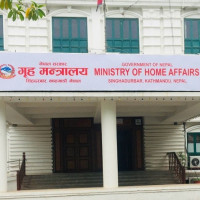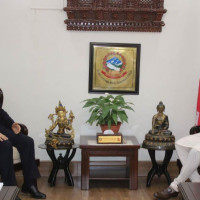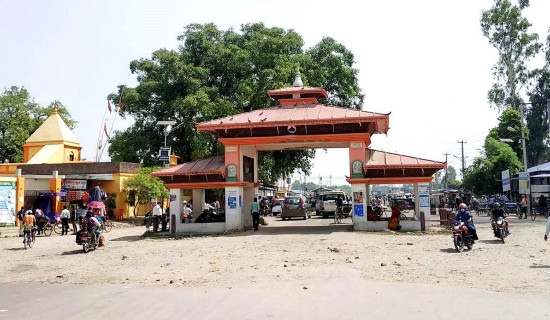- Thursday, 26 February 2026
Can Nepal's Ailing Economy Be Cured ?
Nepal’s economy has remained sluggish since the emergence of COVID-19. Domestic production fell sharply, and supply chains got disrupted because various tough measures, including lockdowns, were in place to control the spread of the killer viral disease. The fast-transmitting disease took its toll on the health of people and the economy around the world. Following the outbreak of the pandemic, the country saw a considerable drop in domestic market demand, resulting in less investment, owing to low credit growth. That led to a loss of many jobs. The pandemic’s effects on Nepal’s economy are still prevalent. The country has witnessed less capital spending, credit recovery issues, slackness in the real estate sector and cooperative frauds over some years. These have also been key obstacles to the revival of the national economy.
Though the successive governments have claimed to have accorded high priority for the revival of the ailing economy, it has failed to show any notable gestures of recovery. However, the country’s external sector economic indicators such as foreign exchange reserves and balance of payments have been indicating encouraging trends due to continuous growth in remittances and tourism receipts after the disappearance of COVID-19. According to the Nepal Rastra Bank (NRB), the nation’s foreign exchange reserves have increased significantly in the first seven months of the current fiscal year, with the balance of payments and the current account in surplus. The falling trade deficit is also considered as one of the reasons for this. However, rising administrative expenditures have become a major impediment.
Challenges
Despite this, the country is still facing numerous challenges in bringing the faltering economy back on track. Even Finance Minister Bishnu Prasad Paudel recently conceded the fact that the state coffer did not have adequate funds to cover administrative costs, let alone the development budget. So, the revival of the economy has been high on the agenda of the federal government. Finance Minister Paudel has also been working hard for this. Having realised the need for experts’ suggestions based on necessary research and analysis to address the existing challenges and problems facing the national economy, the government formed a High-Level Economic Reforms Recommendation Commission headed by former Finance Secretary Rameshwar Prasad Khanal in October last year.
In its final report freshly submitted to the government, the team has suggested several measures ranging from making institutional and legal reforms to establishing good governance in public institutions for acquiring inclusive, stable, sustainable and equitable economic growth. The report calls for developing a concrete guideline in order to create an investment-friendly environment, increase institutional efficiency and bring down the cost of production. The comprehensive document suggests that the government should take steps to repeal nearly one and a half dozen outmoded laws, more than a dozen laws as they have outlived their relevance in the present economic circumstance. The Commission had submitted its interim report to the government some months back.
In addition, the Commission advises the government to close five loss-making public enterprises (PEs), including Janakpur Cigarette Factory and Butwal Yarn Factory, as they have been unable to meet operational benchmarks. They are only draining public resources. The report also points out the necessity for the government to look for strategic partners for the Nepal Airlines Corporation (NAC) to enhance its operational capacity and efficiency. Various previous study teams had also made similar recommendations to strengthen the airline.
Like many other PEs, the national flag carrier has been in the doldrums because of mismanagement and irregularities. Despite having huge resources, the airline has lost its reputation as a reliable and credible carrier. Any country’s tourism industry hinges on the vitality of its flag carrier. Considering this, the government needs to come up with a plan to reform the airline’s management to enhance its international connectivity. The report also draws the government’s urgent attention towards splitting the Civil Aviation Authority of Nepal (CAAN) into two separate entities (regulatory body and facilitating body) as demanded by the European Union. Citing Nepal’s air safety concerns and regulatory issues, the EU has banned Nepali airlines from flying into the skies of that bloc since 2013.
Tourism
This has put the country in a disadvantageous position. Had Nepali carriers been allowed to fly into European cities, the country would have received more European tourists. Since the inception of tourism in Nepal, Europe has been a major tourist source market. However, the number of European visitors to the country seems to have been falling since the imposition of the ban on Nepali airlines. So, all the stakeholders must take this matter seriously and act accordingly.
The recommendations made by the Commission may prove to be a panacea for the revival of our ailing economy if they are implemented effectively. This is because the Commission has drafted this report after analysing all the major segments of the national economy meticulously. It is also important that the government has received this report at a time when the budget for the next fiscal year is being prepared. Since most economic problems pointed out by the Commission are related to maladministration in one way or the other, the government must deliver on its promises of ensuring good governance and putting people at the centre.
(The author is a former deputy executive editor of this daily.)















